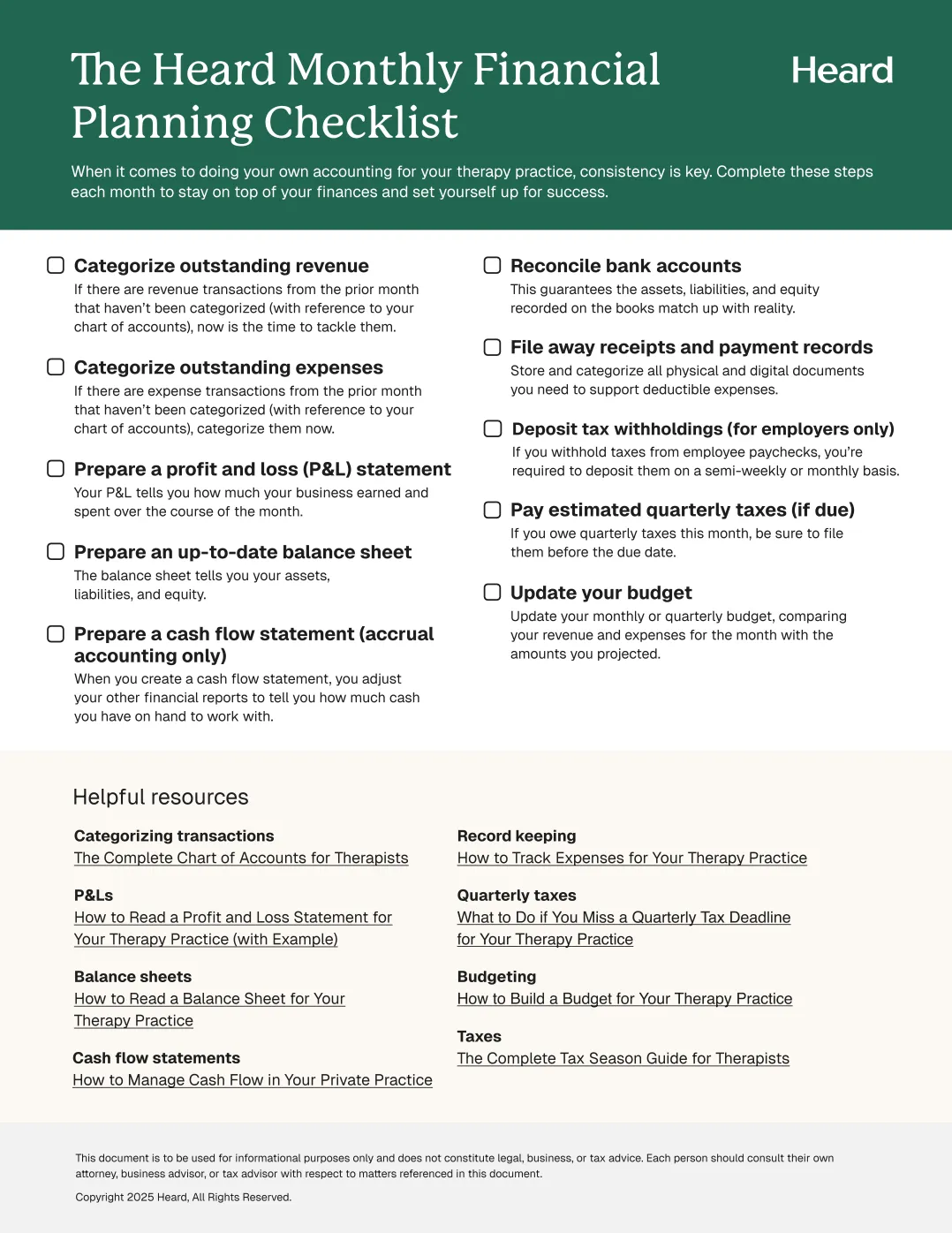As a therapist, offering therapy services at low rates can lead to burnout, resentment, and dissatisfaction.
But raising your rates can feel daunting, awkward, or even “wrong.”
You may have concerns about accessibility, appearing greedy, and charging more than your peers. There’s also fear around what clients and your colleagues will think if you raise your rates.
However, there are many great reasons to take the leap, including:
- You’ll grow in the process
- Clients may value your work more
- It’s great role modeling for your clients
- Raising your rates can keep burnout and resentment at bay
- Having your financial needs met allows you to be a more effective therapist
There are also great reasons not to wait, like setting aside money for retirement and pursuing specialized training.
In this comprehensive guide, you’ll hear from five mental health professionals who share their hard-earned tips for raising your rates as a therapist.
{{resource}}
Why should therapists raise their rates?
This may be preaching to the choir, yet it needs to be said. Raising your rates as a therapist is a crucial step for both personal and professional growth.
Here are several reasons why it’s important to consider increasing your fees.
You set fees too low from the beginning
According to Audrey Schoen, LMFT, a therapist and business coach based in California, many therapists set their initial fees too low. This can happen due to a lack of confidence, a desire to attract clients quickly, or simply underestimating the value of their services.
Over time, as therapists gain experience and expertise, it’s essential to adjust rates to reflect their true worth.
Meeting income needs and goals without burnout
Therapists often find themselves working long hours to meet financial goals, which can lead to burnout. By raising rates, you can reduce your caseload while maintaining or even increasing your income.
Therapists do their best clinical work “when we're not overly stressed or seeing so many clients that we can't keep them straight,” says Jessica Tappana, LCSW, therapist and owner of Simplified SEO Consulting.
“If your current rates mean you are more worried about money or needing to see more clients than you optimally would, is it really helping your clients to keep that rate?"
Demand justifies it
If your practice is consistently full and you’re turning away clients, it’s a clear sign that your rates might be too low. Schoen points out that a full caseload indicates high demand, which can justify higher fees.
Raising your rates can help manage client load while ensuring that you’re compensated appropriately for your time and expertise.
You value your work and expertise
Raising your rates signals to clients that you value your work and expertise.
As Tiffany McLain, LMFT, founder of Lean In. MAKE BANK. shares, therapists often make the mistake of setting rates based on assumptions about what clients can afford or what other therapists charge.
Instead, setting rates based on your financial needs and the value of your services ensures that you’re fairly compensated.
Saving, paying debt, and retirement
Some rates don’t allow you to meet your medium and long term financial goals.
"Therapists actually need to set their rates on the reality of their financial situation, making sure to account for expenses like retirement savings, paying down student loan debt, and building a 3-6 month cash buffer,” explains McLain.
If you’re not earning enough to be able to save, pay debt, and plan for retirement, you may need to raise your rates. Scratch that, you definitely need to raise your rates.
Positive role modeling for clients
When you raise your rates, you demonstrate healthy financial boundaries and self-worth to your clients. This can be particularly empowering for clients who struggle with their own financial boundaries and self-esteem issues.
It’s an opportunity to model the importance of valuing one’s work and ensuring financial well-being.
Things to consider when raising your rates
You may be surprised to hear that a lot of therapists raise their rates and don’t lose any clients. Of course, you don’t want to plan for the best case scenario as it may not always be the same for everyone.
To plan for a smooth rate increase, follow this advice.
Assess your risk tolerance
"A change in rates can lead to a change in your caseload,” notes Schoen. “The amount of fluctuation you can tolerate in your practice will be different for a single parent versus someone with a supportive spouse."
It's crucial to evaluate how comfortable you are with potential changes in your client load and income. Factoring in your unique risk tolerance can help you increase rates with more ease.
Raising rates with existing clients and/or new clients
There is no one-size-fits-all approach to raising rates. Some therapists choose to increase rates only for new clients, while others apply the increase across the board.
You have to decide what’s best for your practice, and whatever you decide, give adequate notice to clients. More on that below.
How to tell a client you are raising your rates
Courtney Morgan, LPCC, founder of Counseling Unconditionally, recommends giving clients sufficient notice about rate increases. This helps to manage their expectations and provides them with time to adjust.
"I recommend giving a minimum of 90 days notice," advises Morgan. “For clients experiencing financial hardship, consider maintaining their current rate for a specified period or indefinitely.”
Giving advance notice has helped Morgan increase her rates without losing clients. It’s a best practice to talk with clients about your rate increase, then email them as well so they have it in writing.
For a rate increase letter that you can use today, check out Dr. Marie Fang’s free rate increase template.
Evaluate the impact on your caseload
It’s important to consider how a rate increase will affect your caseload.
"Some clients might adjust their frequency of sessions or expedite their treatment plans, but most clients continue their therapy undisturbed,” Tappana explains.
This helps you to anticipate potential changes and plan accordingly.
Consider market rates (but don’t let them limit you)
Schoen emphasizes the importance of considering market rates in your area but also advises not to be constrained by them.
"Market research is important, but not everything,” she says. “When starting any business, it’s wise to get a lay of the land.”
That means doing some competitor research, seeing what insurance panels (if any) make sense for your practice, and looking into various marketing channels.
“But it’s also important to remember that you are not trying to work with every single person in town or state,” she continues. “Your ideal clients can exist on the full spectrum of socio-economic status."
As such, Audrey coaches therapists not to limit their fees to what they believe is “affordable.”
The truth is that affordability is relative, and you deserve a practice and fee structure that supports you and your clients needs.
{{resource}}
Addressing common fears about raising rates
In 2022, 64% of therapists surveyed by Heard said they were planning to raise their fees in 2023. Yet when surveyed again for the 2024 Financial State of Private Practice Report, only 33% actually did. So why don't therapists raise their fees?
Raising your rates can be daunting, and many therapists experience common fears that need to be addressed to ensure a smooth transition.
Here are some of the most frequent concerns and tips to overcome them.
Fear of losing clients
One of the biggest fears therapists have is losing clients due to a rate increase. Kristie Tse, LMHC, founder of Uncover Mental Health Counseling, notes that many therapists fear being seen as greedy and losing clients altogether.
"Overcoming these fears involves understanding the value of your work, setting boundaries, and communicating transparently with clients about the reasons behind the increase," says Tse.
Clients are capable of adapting to new information. And you can always make exceptions for clients who are in desperate financial straits. Don’t let fear of losing clients hold you back.
Fear of negative client reactions
Therapists often worry that clients will react negatively to a rate increase. Schoen suggests addressing these fears by preparing for potential reactions and managing them clinically.
"Clients are going to have reactions, and those reactions can be addressed clinically,” she explains. “What's important is to work through our own fears so our reactivity doesn't show up in the therapy room during conversations about money and fees.”
Doing your own work in financial therapy can make all the difference in setting (and sticking to) your increased rates.
Fear of being judged by other therapists
Therapists may also fear judgment from their peers. But it’s important to recognize when an atmosphere of judgment and fee-shame hinders you.
"We must stop basing our fees on generations of other therapists undervaluing themselves,” Schoen highlights. “There is nothing noble about living at the edge of poverty in the name of service.”
You deserve to earn a sustainable living that accounts for your wants, needs, and lifestyle goals. That means both short term and long term.
“Other therapists' reactions to your fee says more about their relationship with money than it does about you," Schoen concludes.
Strategies to mitigate fears
Here are some strategies to mitigate fears about raising your rates.
Transparent communication
Clearly explain the reasons for the rate increase to your clients, emphasizing the value and quality of care they receive.
Gradual increases
Consider implementing small, incremental increases to make the transition easier for clients. You may want to do 2-3 increases per year (with advance notice) until you reach your desired rate.
Support systems
Surround yourself with a supportive network of colleagues who understand and support your decision to raise rates. Consider joining a practice building community like Balanced Private Practice or Lean In. MAKE BANK., from Schoen and McLain respectively.
Impact on perception of value and expertise
Now for a positive note. Have you ever considered that raising your rates can positively impact how clients perceive your value and expertise?
Here’s what the experts have to say.
Signaling higher quality
Schoen explains that higher rates can signal higher quality and expertise to clients.
"Raising rates can positively impact the perception of a therapist's value and expertise by signaling to potential clients that higher rates often correlate with higher quality and expertise," she notes.
Enhancing perception of expertise
Tse adds that “raising rates can enhance the perception of demand, expertise, and quality of care.”
It’s the same perception difference between a $10 pair of glasses and a $50 pair of glasses, though they may be made with the same material.
Price is one indicator of value, and a strong one at that.
Finding the right amount to increase rates
Determining how much to increase your rates requires some simple math. You can use Heard’s Session Fee-Setting Calculator to play with the numbers. Lean in. MAKE BANK. also has a Fun with Fees Calculator you may find helpful.
The key is to gradually increase your rate until you find a happy homeostasis. You don’t want to make a huge leap, like doubling your rates overnight. Here are some better ways to go about it.
Start with the end in mind
"Determine what you need to earn to meet your income needs and goals, then work backwards,” advises Schoen.
“How many clients can you see each week and be well? This work needs to be sustainable," she advises.
Starting with the end in mind can set you up on the right footing. Often, we need to look at the facts and not what others are doing to make the best decisions. That’s what starting fresh can help you do.
Avoid common mistakes
"There are three common mistakes therapists make when calculating their rates,” says McLain.
Setting rates based on what they think other therapists in their area are charging, what “feels right,” and what they imagine their current clients can afford are the three mistakes McLain sees most commonly.
It can be hard to separate yourself from what others are doing. But it’s important to take care of your own financial needs first. Otherwise, how can you be fully present for your clients?
Indicators that a rate increase is overdue
Certain signs can indicate that it’s time to raise your rates.
Here are a few to watch for:
- You haven't increased your rates in over a year
- You are feeling burned out, overwhelmed, or exhausted
- You are just making ends meet month to month
- You are unable to save for retirement or other financial goals
- You’re ¾ full or more, indicating demand for your services
There’s also another compelling reason to raise your rates: you want to.
At the end of the day, your therapy practice is your business. You get to decide what works for you and what doesn’t.
On the other hand, you also have to increase demand for your services so that a higher rate makes sense.
Full schedules and long waiting lists
Kristie adds that “full schedules, long waiting lists, difficulty covering expenses, and lower rates than peers with similar experience are indicators that a rate increase is overdue.”
You don’t have to overwork yourself to the point of burnout to serve your community. Why not increase your rates while decreasing your caseload, then reinvest that time in education and training?
{{resource}}
Addressing guilt and imposter syndrome
Feelings of guilt or imposter syndrome can hinder your decision to raise rates. Here’s how to address them.
Therapy or coaching
Schoen recommends engaging in therapy or coaching to address money issues and develop a positive money mindset.
"Engage in therapy or coaching to address your own relationship with money,” she advises. “Surround yourself with others with a positive money mindset.”
If you’re struggling with money mindset and can’t afford much in the way of therapy or coaching, try a financial therapy workbook. Personally, I used The Financial Anxiety Solution workbook by Lindsay Bryan-Podvin and found so much healing. I highly recommend it.
Reminding yourself of your qualifications
When it comes to fee-shame and guilt around charging your worth, Tse has a few suggestions.
"Remind yourself of your qualifications, the impact of your work, and the importance of self-care and fair compensation," she says.
You can also remind yourself that in sticking up for your needs and goals, you’re role-modeling positive behavior for clients. Win-win!
Acknowledging feelings
It’s important to acknowledge your feelings and reassess your values and finances.
"The first step in addressing feelings of guilt or imposter syndrome when considering raising your rates is simply acknowledging that those feelings are there, and realizing that it is a very normal human response," Morgan states.
Just like you don’t have to believe every thought you think, you don’t have to act on every emotion you feel. You can set an increased rate for your services, even if it feels scary.
Overcoming imposter syndrome
Imposter syndrome can significantly impact your decision to raise your rate. To combat this, Tappana suggests reframing the way you view your services.
"Remember that your extensive education and the profound impact of your work on clients' lives deserve recognition and appropriate compensation," she advises.
Engaging in peer support and supervision can also help combat feelings of imposter syndrome.
Raise your rates before you’re ready
If you don't raise your rates, you have less spending power each year due to inflation. Importantly, raising your rate frees you to be the best version of yourself in therapy sessions.
Remember that you don't need to justify your rates. You just need great marketing to attract clients willing to pay your rates.
By understanding the reasons for raising rates, considering important factors, and addressing common fears, you can confidently make decisions that support both your professional growth and personal well-being.
Who knows? Your clients might just value your services more when they see you advocating for your financial wellness.
––
This post is to be used for informational purposes only and does not constitute legal, business, or tax advice. Each person should consult their own attorney, business advisor, or tax advisor with respect to matters referenced in this post.
Brandon Grill is a mental health copywriter and marketer based in Las Vegas, NV. He loves helping therapy practices attract more perfect-fit clients through SEO. Outside of work, you can find Brandon spending time with his nephews, reading self-help, and meditating.
{{cta}}
Manage your bookkeeping, taxes, and payroll—all in one place.

Discover more. Get our newsletter.
Get free articles, guides, and tools developed by our experts to help you understand and manage your private practice finances.





